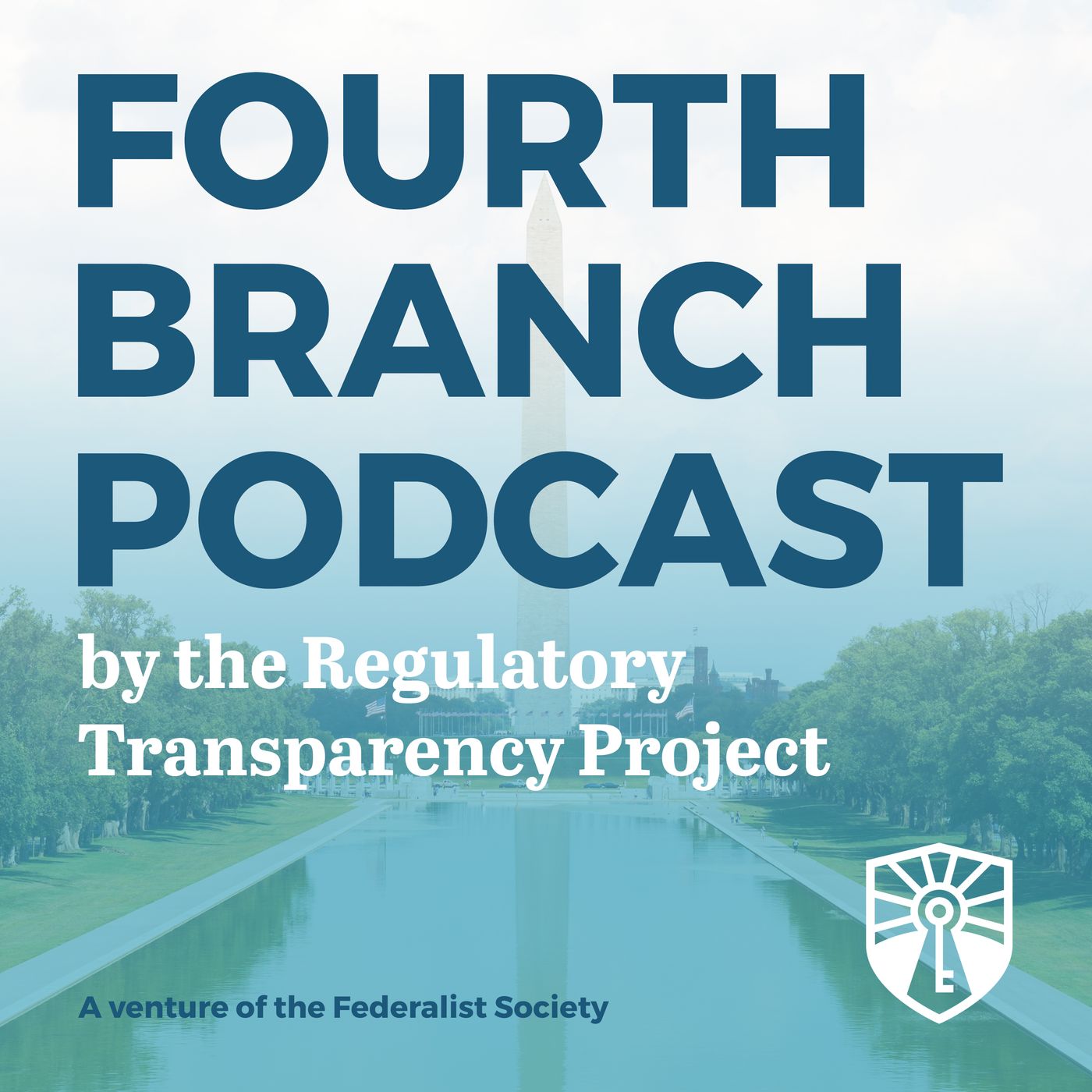

RTP's Fourth Branch Podcast
The Federalist Society
The Regulatory Transparency Project is a nonprofit, nonpartisan effort dedicated to fostering discussion and a better understanding of regulatory policies. On RTP’s Fourth Branch Podcast, leading experts discuss the pros and cons of government regulations and explain how they affect everyday life for Americans.
Episodes
Mentioned books

Dec 10, 2024 • 31min
Immigration Enforcement, Business Compliance, and the Equal Access to Justice Act
In this episode, Randel K. Johnson and Andrew Kilberg discuss the often ephemeral nature of the Rule of Law in immigration and other enforcement proceedings, with a particular focus on the challenges faced by small businesses when confronted with a heavy-handed bureaucracy and the practical difficulties of obtaining judicial review. The experts also examine the Equal Access to Justice Act (EAJA), considering potential legislative reforms to improve the ability of small entities to vindicate their rights before agencies and the courts while improving enforcement and maintaining accountability in regulatory matters. Featuring: Randel Keith Johnson, Immigration Academic Fellow, Cornell Law School Andrew Kilberg, Partner, Gibson Dunn

Nov 16, 2024 • 52min
Explainer Episode 79- Don't Chase Rabbit Trails: The SEC Now and in the Next Administration
In this episode, financial experts look back on recent SEC regulation, enforcement, and litigation, as well as their predictions for the next SEC leadership under a second Trump administration. C. Wallace DeWitt, Securities lawyer Brian Knight, Director of Innovation and Governance and Senior Research Fellow, Mercatus Center at George Mason University Jennifer Schulp, Director of Financial Regulation Studies, Cato Institute’s Center for Monetary and Financial Alternatives

Nov 13, 2024 • 1h
Deep Dive 301 - Exploring Tradeoffs: The Nexus Between Antitrust and Security
Antitrust efforts have become prevalent in the courts and legislative bodies, both in the United States and abroad. A recent example is the U.S. Department of Justice's case against Google for alleged anticompetitive behavior in its search business. Though cybersecurity and national security concerns are traditionally not included in antitrust efforts, the implications of such priorities should be carefully considered. Join a panel of leading security and antitrust experts for a discussion on recent antitrust actions, how security is directly and indirectly implicated, and considerations for the future.

Nov 5, 2024 • 55min
Explainer Episode 78 - An Overview of Electric Industry Regulation
J. Kennerly Davis presents an overview of electric industry regulation. Davis discusses how regulation has changed in a fundamental way over the last 140 years, and what that change has meant for electric customers large and small.

Nov 5, 2024 • 1h
Deep Dive 300 - A Debate on Separation of Powers: Was SEC v. Jarkesy Rightly Decided?
The Regulatory Transparency Project and the Federalism & Separation of Powers practice group hosted a virtual debate over the recent Supreme Court decision in SEC v. Jarkesy. The panel featured Matthew Wiener, from Penn Carey Law, and Josh Robbins, of the Pacific Legal Foundation. Michael Buschbacher, from Boyden & Gray PLLC, moderated the debate.

Oct 24, 2024 • 34min
Explainer Episode 77 - State Regulatory Reform and Overcoming Regulatory Inertia
Tanner Jones and Jonathan Wolfson from the Cicero Institute discuss their co-authored paper titled "Restoring Legislative Authority: A Balanced Approach to Agency Deference." They explore the implications of the Chevron deference decision and the Loper Bright case. The conversation addresses the impact of these decisions on administrative law, regulation, and specifically on the states.

Oct 23, 2024 • 1h
Deep Dive 299 - How Does AI Affect Rulemaking?
A panel of experts will engage in a legal discussion about the implications of using AI in rulemaking, as AI technologies inadvertently influence the process of creating and implementing regulations. The panel will also consider how rulemaking and AI influence the legal and political realms. Featuring: Speakers: Catherine Sharkey, Segal Family Professor of Regulatory Law and Policy, New York University School of Law John Nay, Founder & CEO, Norm Ai J. Kennerly Davis, Former Senior Attorney, Hunton Andrews Kurth LLP (Moderator) Daniel Flores, Senior Counsel, Committee on Oversight and Accountability, U.S. House of Representatives

Oct 23, 2024 • 60min
Deep Dive 298: What Should The Next Administration Do About AI?
This virtual event explored the potential trajectories of AI policy under the upcoming shift in presidential administrations. Our expert panel, featuring Ash Kazaryan, Adam Kovacevich, and Neil Chilson, examined the critical issues surrounding AI and offered insights on what policymakers need to know as they navigate rapidly evolving AI technologies. This discussion, moderated by Adam Thierer, provides a balanced range of perspectives on how future administrations can effectively approach AI governance.

Oct 23, 2024 • 1h 6min
Deep Dive 297 - Climate Disclosure Litigation: Examining Legal Battles Against California and the SEC
A panel of distinguished legal scholars and practitioners will provide an overview of the current landscape of litigation surrounding climate disclosure regulations. Experts will discuss the legal challenges facing both the SEC’s climate disclosure rule and California’s SB 253 and 261. Panelists will address the legal questions raised during litigation over climate disclosure regimes, as well as the regimes’ implications for corporate governance, consumers, and investors.Featuring:Victor B. Flatt, Coleman P. Burke Chair in Environmental Law, School of Law, Case Western Reserve UniversityStephen W. Hall, Legal Director and Securities Specialist, Better MarketsTrent McCotter, Partner, Boyden Gray PLLC[Moderator] Marc Marie, Policy Fellow, Regulatory Policy, Americans for Prosperity

Oct 16, 2024 • 49min
Explainer Episode 76 - Examining State AGs' Use of Outside Counsel
In this episode, Ketan Bhirud and Luke Wake take a closer look at the role of the use of outside legal counsel by state attorneys general. Outside counsel can provide valuable expertise and resources, but what are the implications of relying on external firms for state legal matters? What are the advantages and potential pitfalls of these partnerships? How might they shape state legal practice and ultimately impact the public?


